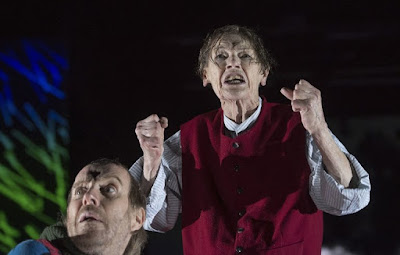Resisting Inhumanity
The headline for this "The Two-Way" report last spring from National Public Radio's Bob Mondello sums it up well: "Only Script in Shakespeare's Hand Urges Compassion for Migrants."
http://www.npr.org/sections/thetwo-way/2016/03/16/470729477/only-script-in-shakespeares-handwriting-urges-compassion-for-migrants
Recent events have made the manuscript even more timely.
William Shakespeare, possibly when he was already in semi-retirement, was apparently called in as a script doctor for a play. Started in the 1590s, primarily written by Anthony Munday and Henry Chettle, the script was never staged during the Tudor and Stuart reigns, because it was about Thomas More: the statesman, Catholic apologist, and creative philosopher (as in his Utopia) who refused to give his approval to the divorce of Henry VIII from Catherine of Aragon and the marriage of the king to Anne Boleyn – the mother of Queen Elizabeth I. Sensitive subject matter to be sure, calling for care in development and wisdom in choosing to stage or not. As the NPR article notes, one set of speeches is recognized as Shakespeare's handiwork – in fact, the few manuscript pages containing those speeches constitute the one partial script we have by Shakespeare that seems to have been written in his own hand.
The play Sir Thomas More includes a scene depicting the May Day riots of 1517, when a number of London citizens were incited to protest violently the presence of foreigners doing business, especially on Lombard Street. The historical More attempted to quell the unrest, in his capacity as under-sheriff of London, but any success was limited and short-lived. In the play, however, More decisively calms the crowd – and his skill in dealing with the situation attracts the attention of political patrons who would assist More's eventual advancement to the office of Lord Chancellor. Shakespeare's longtime theatrical company, the King's Men, understandably sought out the playwright who time and again had scripted convincing scenes showing the power of rhetoric to shape response. This situation presents a dire theatrical and psychological challenge, since suspicion and hatred toward the foreigner – the stranger, in Early Modern terminology – are among the strongest of our worst instincts as a species. What might persuade rioters to resist those instincts?
Addressing the crowd, Shakespeare's More invites the citizens to imagine that London has been purged of the immigrants, as they claim to wish:
Grant them removed, and grant that this your noise
Hath chid down all the majesty of England;
Imagine that you see the wretched strangers,
Their babies at their backs and their poor luggage,
Plodding to the ports and coasts for transportation,
And that you sit as kings in your desires,
Authority quite silent by your brawl,
And you in ruff of your opinions clothed;
What had you got? I’ll tell you: you had taught
How insolence and strong hand should prevail,
How order should be quelled; and by this pattern
Not one of you should live an agéd man,
For other ruffians, as their fancies wrought,
With self same hand, self reasons, and self right,
Would shark on you, and men like ravenous fishes
Would feed on one another . . .
What a wonderfully Shakespearean move – to transform the word shark from a noun to a verb. More's listeners begin to be persuaded, even as he suggests that their defiance of the king's leniency toward the refugees constitutes not only treason but sin against the Divine Will that put the king in command over them. But perhaps the king would grant them exile, rather than the death sentence that traitors deserve by law:
Say now the king
Should so much come too short of your great trespass
As but to banish you, whither would you go?
What country, by the nature of your error,
Should give you harbor? Go you to France or Flanders,
To any German province, to Spain or Portugal,
Nay, any where that not adheres to England,
Why, you must needs be strangers: would you be pleased
To find a nation of such barbarous temper,
That, breaking out in hideous violence,
Would not afford you an abode on earth,
Whet their detested knives against your throats,
Spurn you like dogs, and like as if that God
Owed not nor made not you . . . what would you think
To be thus used? this is the stranger's case;
And this your mountainish inhumanity.
And another richly Shakespearean word,
mountainish: meaning barbarous, uncivil, and uncivilized, but
also suggesting huge, massive, and monstrous.
As noted in the NPR report, Sir Ian
McKellen – who performed as Sir Thomas in this play for its first
ever production back in the 1960s – has recently seen its
applicability to the condition of refugees everywhere. People fleeing
war, terror, oppression, and deprivation have often been met with
resentment, suspicion, indifference at best and violence at worst.
McKellen has turned to this speech and in a series of public
appearances takes the time to deploy the eloquence of Shakespeare's
More in the service of compassionate reaction and action. His hope is
that Shakespeare's language can work its effects beyond the realm of
the stage, beyond the imagined or reimagined worlds of the play –
as he utters again these words in order to promote more humane
responses to the plight of other human beings. This hope is all the
more important when unjust leaders seek to stoke and even profit from
hatred, rather than quell it.





